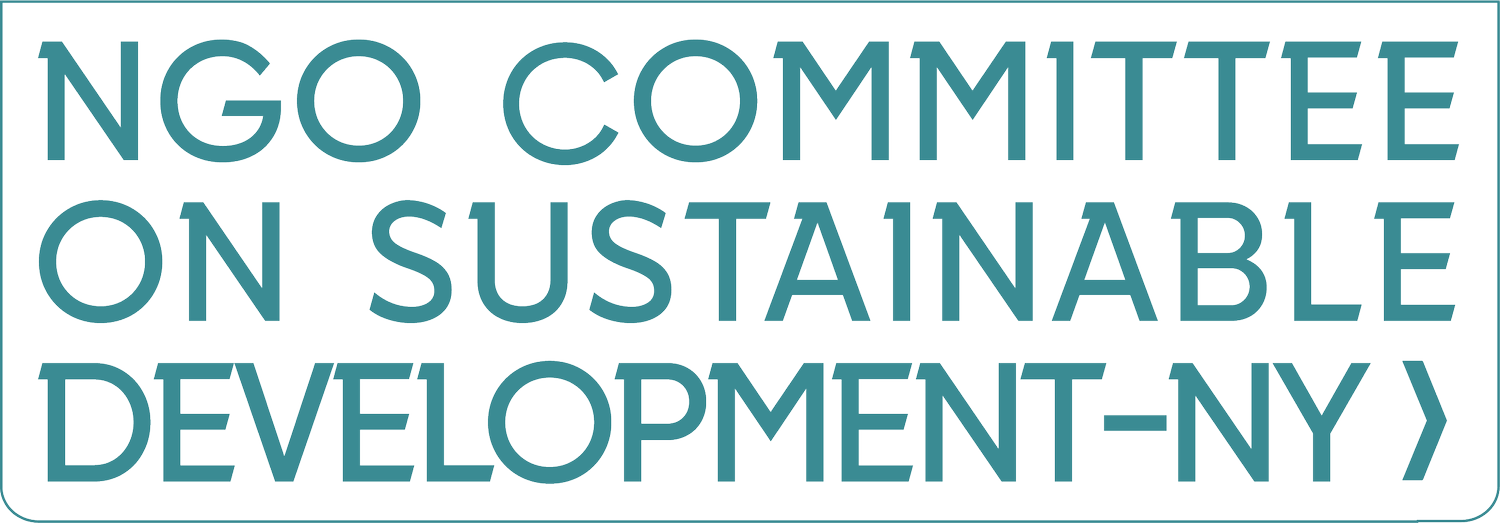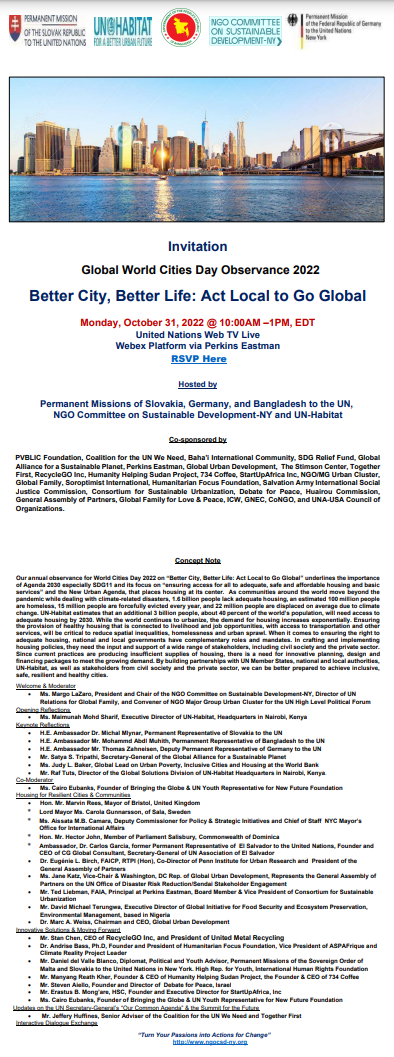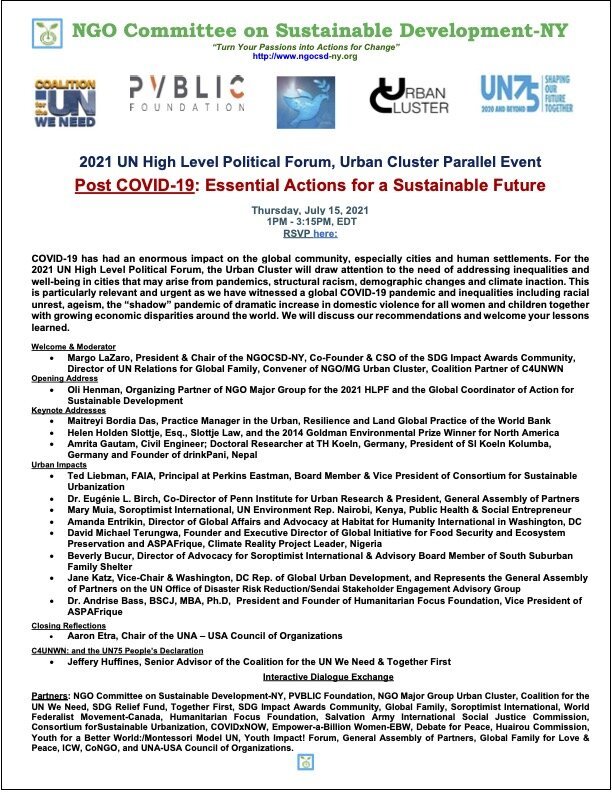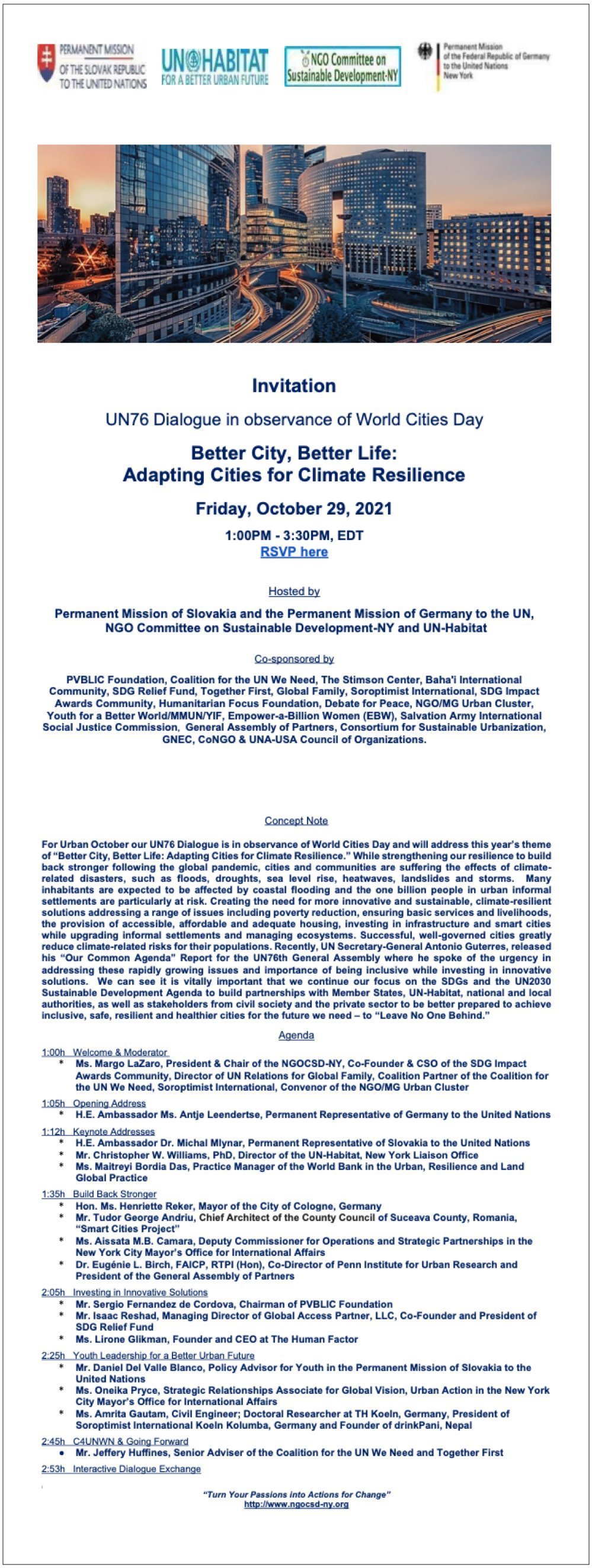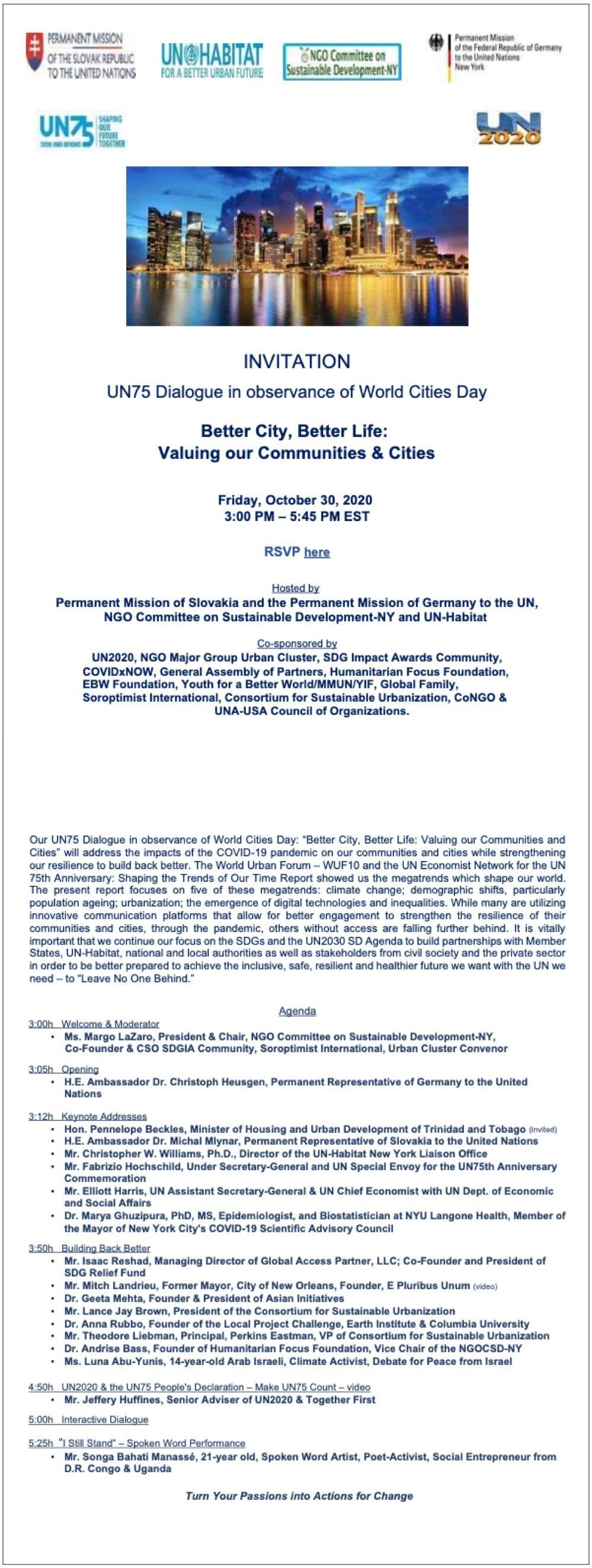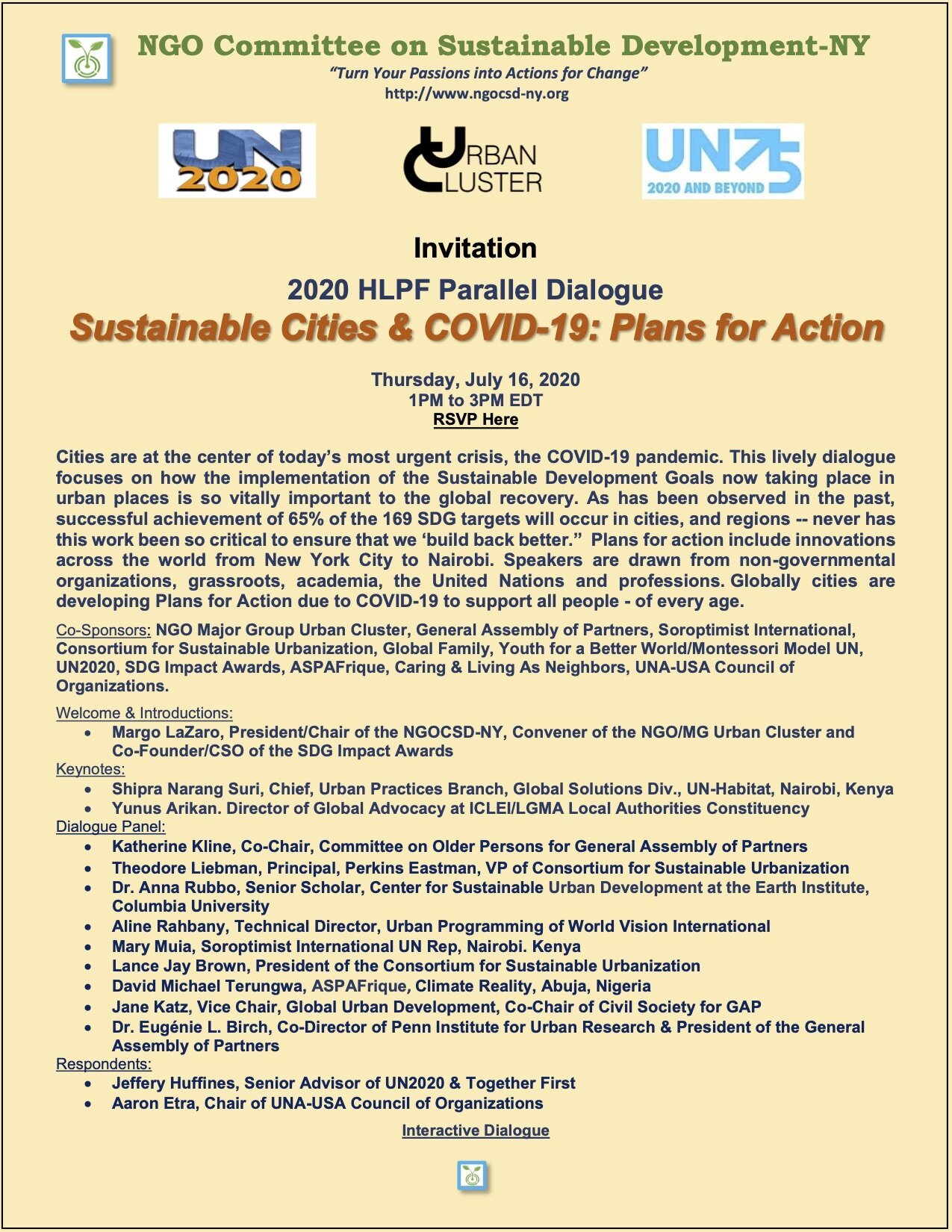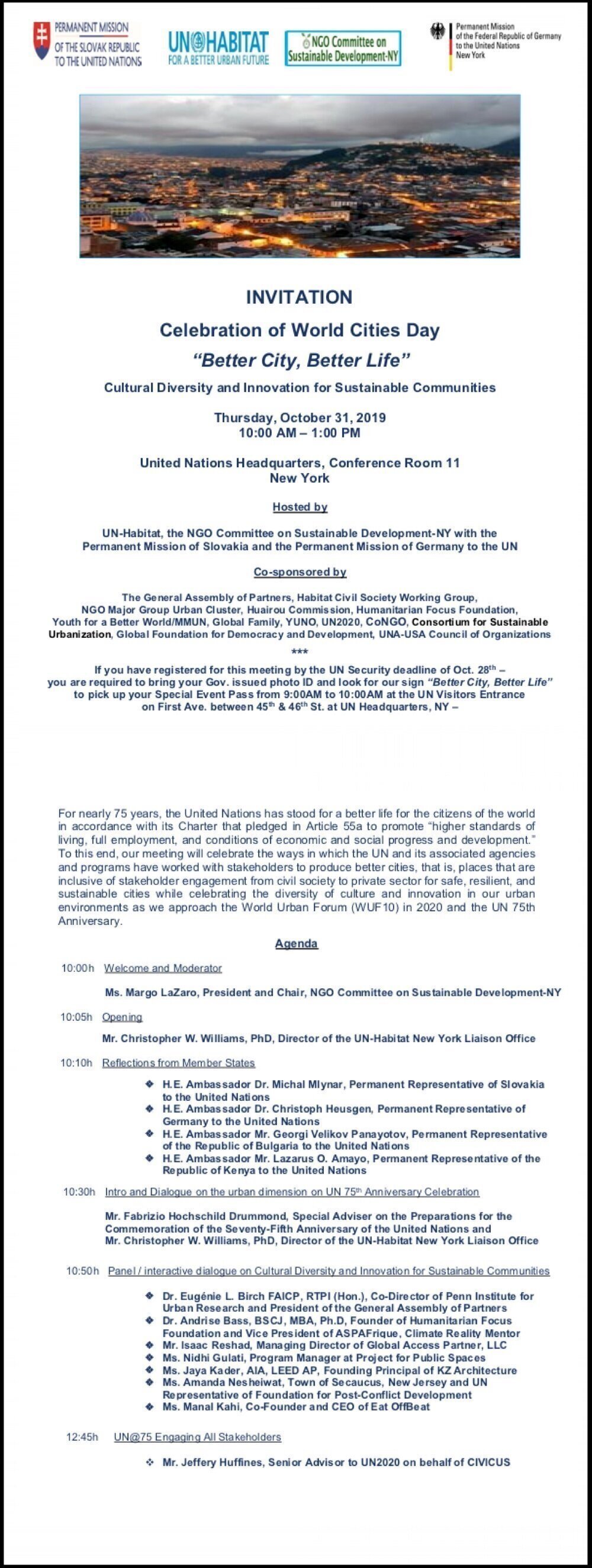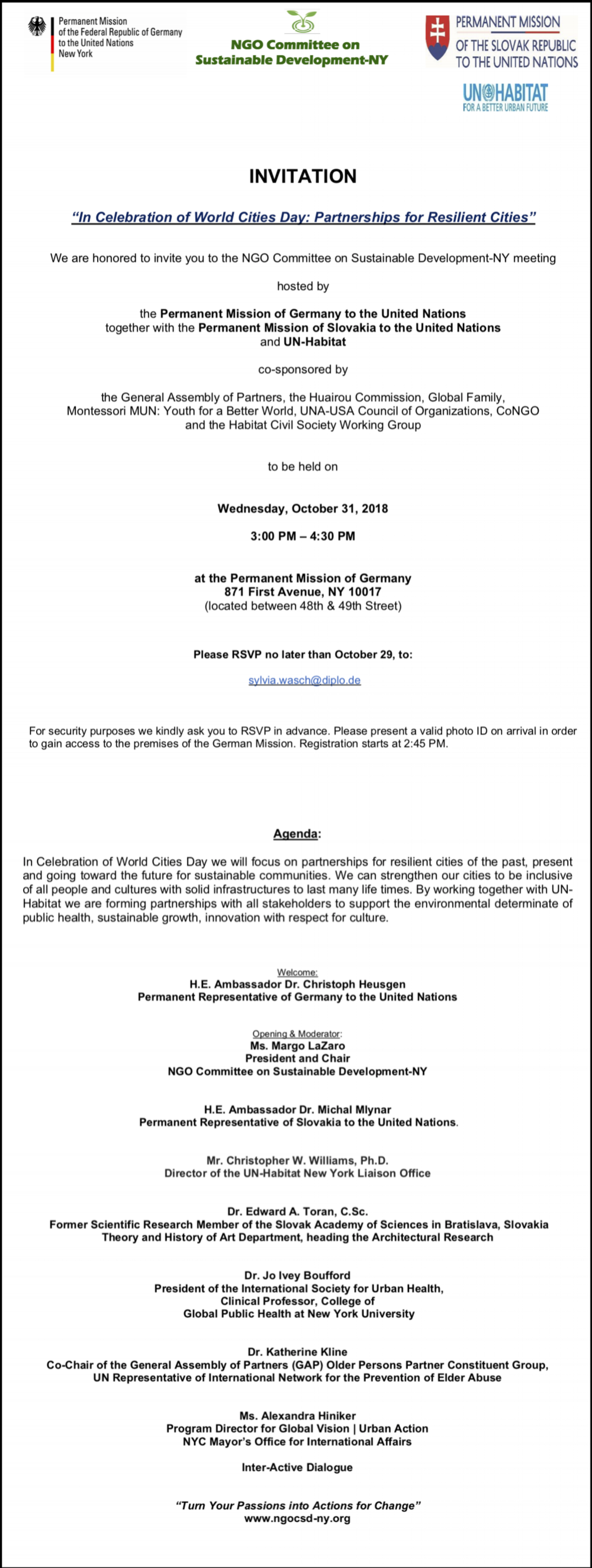
NGO Major Group Urban Cluster
NGO-Major Group Urban Thematic Cluster 2023 HLPF Position Paper
NGO-MG Urban Thematic Cluster 2023 HLPF Position Paper (Document)
INTRODUCTION:
The NGO Major Group Urban Thematic Cluster (“Urban Cluster”), aligns with the UN High Level Political Forum for the Sustainable Development Goals, UN-Habitat, the New Urban Agenda, including the UN Secretary General Antonio Guterres’ “Our Common Agenda and the 2024 UN Summit of the Future. The Urban Cluster recognizes that with an estimated two-thirds of humanity - 6.5 billion people of all ages - living in cities by 2050, increasingly from the developing world, governments cannot achieve sustainability, resilience, and poverty reduction without significantly transforming the way we plan, design, build, and manage our urban areas to “Leave No One Behind. “
The Urban Cluster draws attention to the need to address inequalities and challenges to well-being in cities that may arise from pandemics, structural racism, demographic changes, discrimination against persons with disabilities and climate inaction. This is particularly relevant and urgent as we have witnessed the consequences of a global COVID-19 pandemic and inequalities, including racial unrest, ageism, the “shadow” pandemic of dramatic increase in domestic violence for all women and children together with growing economic disparities around the world.
As a majority of the world’s population lives in places that extend from urban to rural, the Urban Cluster addresses how Sustainable Development Goal SDG 11 (“Make cities and human settlements inclusive, safe, resilient, and sustainable”), integrates with the other 16 SDGs, and with other global agreements, such as the Paris Agreement, the Sendai Framework for Disaster Risk Reduction. The Urban Cluster aligns with the New Urban Agenda and the documents developed for its localization from the civil society perspective.
As more than 193 countries endorsed the SDGs to address the global challenge of eradicating poverty and achieving sustainable development in a balanced, equitable, integrated, and cross sectoral manner, the Urban Cluster is focused on SDG 11 as a means to ensure access to safe, adequate, accessible and affordable housing, upgrading and legalizing informal settlements, investing in public transport, creating accessible and safe green public spaces, protecting natural and cultural heritage, reducing adverse effects of natural disasters and the impacts of climate change on cities while improving urban planning and supporting innovative management and governance. The Urban Cluster holds that balanced territorial development should guide national, regional and local policies in fulfillment of SDG 11 which needs to be seen as cross cutting as it relates to other SDGs. Broad stakeholder participation inclusive of marginalized groups often left behind in the formulation, implementation, and monitoring of such policies is essential.
2023 UN HIGH LEVEL POLITICAL FORUM (HLPF):
The theme of the 2023 HLPF is “Accelerating the recovery from the coronavirus disease (COVID-19) and the full implementation of the 2030 Agenda for Sustainable Development at all levels”. The HLPF in 2023 will review in-depth Sustainable Development Goals 6 on clean water and sanitation, 7 on affordable and clean energy, 9 on industry, innovation, and infrastructure, 11 on sustainable cities and communities, and 17 on partnerships for the Goals. The forum will take into account the different and particular impacts of the COVID-19 pandemic across all Sustainable Development Goals and the integrated, indivisible and interlinked nature of the Goals. As SDG 11 will specifically be reviewed this year, we support its broad application and its alignment with all of the SDGs. Cities have been impacted especially hard during the pandemic and those that have densely populated areas, especially in informal settlements, have been the most impacted. Cities also have been the place where innovative responses to those challenges have galvanized all community sectors and have shown where increased inequities exist.
SDG 6 - Clean Water and Sanitation: We agree with the United Nations that ongoing urbanization brings opportunities for more efficient water management and improved access to drinking water and sanitation. At the same time, problems are often magnified in cities, and are currently outpacing our ability to devise solutions. As a result of climate change and the pandemic access to clean water and sanitation and an increase in water-based disasters, such as extreme flooding, hurricanes, and droughts have significantly impacted both urban and rural areas, especially those living in informal settlements. Issues of water and sanitation are related to food security, sewage management, plastic pollution and industrial waste. In addition, clean water and sanitation impacts health, jobs and mobility.
Recommendations: We support innovation in waste management, full cycle reuse, and policies that support education and actions to preserve clean water as a vital resource. Clean water is a human right. We need to engage all stakeholders including governments, the private sector, and communities to promote and advocate for affordable and accessible sustainable solutions, such as NBS (Nature Based Solutions), innovative technologies, and socio-cultural innovations.
SDG 7 - Affordable and Clean Energy: Cities must adopt innovative, affordable, and energy efficiency throughout our existing and future built environments. All infrastructure should take advantage of affordable, efficient, and accessible clean energy.
Recommendations: We advocate for universal access to affordable, reliable, and innovative energy sources; provide improved energy efficiency, as well as clean energy in housing and transportation. We support affordable and clean energy provided by renewable energy resources generating electricity. Consideration should be given to other energy sources, including nuclear energy.
SDG 9 - Industry, Innovation and Infrastructure: We support a sustainable and resilient approach to industry, design,, innovation and infrastructure. As we have witnessed recent collapses in building structures as a result of major earthquakes, lack of enforcement and monitoring of building codes and standards, and major conflicts, safe and resilient infrastructure in buildings and workplaces are critical. Innovations including 3-d printing, utilizing traditional and new materials, the advent of mass timber, and the promotion of new mechanical systems should be more fully explored and incorporated.
Recommendations: We promote the use of traditional and indigenous means and methods as well as new and innovative means to produce a well-built environment.
SDG 11 - Sustainable Cities and Communities: Make cities and human settlements inclusive, safe, resilient, and sustainable. Be cross-sectoral and holistic in the approach to achieving the objectives. Consider context, climate, and culture including history and legacy. Both land and water-based, and natural and man-made environments need to be considered. All areas of the world are subject to disasters and this must be recognized as such, hence, developing disaster risk preparation and early-warning systems, disaster-risk reduction and response protocols are needed. Cities and communities comprise a full range of human activity from adequate housing to urban agriculture, from public transportation to micro-mobility, and all work, play, social, and infrastructure activities. SDG 11 relates to all 16 other SDGs and must engage them as required by time and context.
Recommendations: We support the implementation of UN-Habitat and other UN agencies’ policies and programs consistent with the New Urban Agenda and other global agreements. Invest in adequate housing in informal settlements as a lever to advance resilience and sustainable development. Recognize contributions of community leaders and provide them tools needed for a better future. Promote mitigation, adaptation, resilience, and disaster risk management in the planning and design of cities in the era of climate change. Consider the broad range of traditional and indigenous approaches as well as innovative solutions, including nature-based solutions, to existing and future challenges.
SDG 17 - Partnerships: The Urban Cluster will continue to focus on new opportunities to bring attention to the importance and need to address issues of sustainable urbanization, resilience, mobility, health and wellness and the public realm. We urge Member States and Local Authorities to support the right to the city, including affordable and accessible housing, for all people to be able to live with equity, equality, inclusion and dignity.
Recommendations: The NGO Committee on Sustainable Development-NY and the Urban Cluster actively promote the need to build cohesive and inclusive partnerships with all stakeholders, including UN Member States, UN Agencies, academia, civil society, and the private sector, to support UN-Habitat in the implementation of the New Urban Agenda to design equitable spatial, social, environmental and economic aspects of the SDGs to accelerate their implementation.
Position Paper Archive
Position Paper aRchive
-
Convener: Margo LaZaro, NGOCSD-NY
Notes: Katherine Kline, GAP
Marta Benavides – El Salvador
Prof. Genie Birch – General Assembly of Partners
Jan Peterson – Huairou Commission
Pam Ransom Huairou Commission
Jane Katz, UN/Disaster Risk Reduction
Dan Perell, Baha’i International Community
Anna Rubbo, Columbia University
Faisal Alfadl, General Manager of Saudi Green Building Forum
Mary Muia, Soroptimist International UN Rep at UNEA - Kenya
Bev Bucur, Soroptimist International
Bette Levi, Soroptimist International
Thomas Forster – Food Cluster
David Michael Terungwa, Climate Reality
Aline Rahbany, World Vision
Arelys Bellorini. World Vision
Judith Hermanson
Ted Liebman, FAIA, a Principal at Perkins Eastman, Consortium for Sustainable Urbanization
Lance Jay Brown, Consortium for Sustainable Urbanization
Yunus Arikan, ICLEI, Germany
Luis Artieda
Sri Sofjan, Huairou Commission
Dr. Andrise Bass. Humanitarian Focus Foundation
Kakha Nadiradze
Amrita Gautam, Soropimist International, Nepal & Germany
Amanda Entrikin, Habitat for Humanity
Aliye Celik, UN Habitat
Ayushi Kundu, Soroptimist International, India
